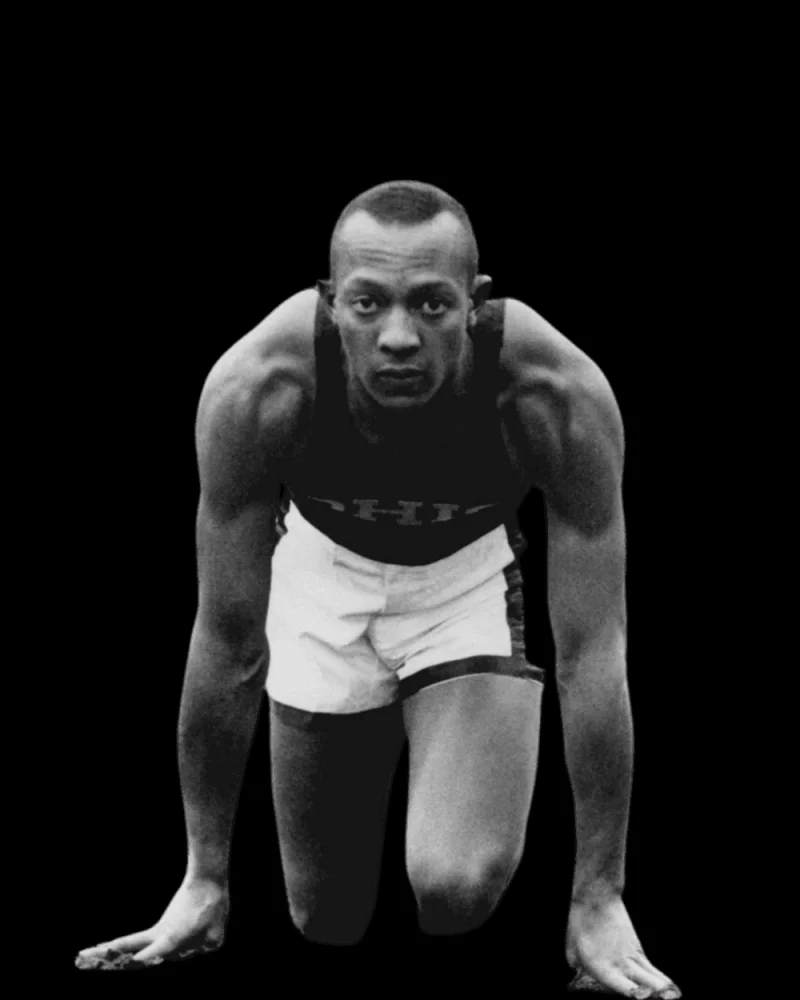Short Summary
Jesse Owens was an American track and field athlete who gained international fame at the 1936 Berlin Olympics, where he won four gold medals. His triumphs on the world stage not only made him a symbol of athletic excellence but also challenged the Nazi ideology of racial superiority. Owens is celebrated not only for his remarkable athletic achievements but also for his role in advancing civil rights and equality through sports.
Early Life & Education
James Cleveland "Jesse" Owens was born on September 12, 1913, in Oakville, Alabama, as the youngest of ten children. His family moved to Cleveland, Ohio, when he was nine, seeking better opportunities. It was in Cleveland that his potential as an athlete began to shine. Owens attended Fairmount Junior High School and later East Technical High School, where his talents in track and field were nurtured by supportive coaches. His performance in high school led to a scholarship at Ohio State University, where he continued to excel despite racial segregation and discrimination.
Career Highlights
Owens's career reached its pinnacle during the 1936 Berlin Olympics, where he won gold in the 100 meters, 200 meters, long jump, and 4x100 meter relay, stunning the world and defying Adolf Hitler's racial superiority claims. Prior to the Olympics, Owens set three world records and tied another in less than an hour at the 1935 Big Ten meet in Ann Arbor, Michigan, a feat often called "the greatest 45 minutes ever in sport." His achievements at the Olympics and throughout his career made him a celebrated figure in the fight against racial discrimination.
Major Achievements
- Won four gold medals at the 1936 Berlin Olympics, challenging Nazi racial ideology.
- Set three world records and tied another within 45 minutes at a 1935 track meet.
- Inducted into the Alabama Sports Hall of Fame in 1970.
- Posthumously awarded the Congressional Gold Medal in 1990.
Famous Quotes
- "We all have dreams. But in order to make dreams come into reality, it takes an awful lot of determination, dedication, self-discipline, and effort."
- "The battles that count aren't the ones for gold medals. The struggles within yourself—the invisible battles inside all of us—that's where it's at."
Interesting Facts
- Owens was nicknamed "Jesse" because a teacher misunderstood his Southern accent when he said "J.C.," his initials.
- He was awarded the Presidential Medal of Freedom in 1976 by President Gerald Ford.
- Despite his Olympic success, Owens faced significant racial discrimination upon returning to the United States.
- He worked as a gas station attendant, playground janitor, and manager of a dry cleaning firm before finding steady work as a sports promoter.
Legacy / Influence
Jesse Owens's legacy extends beyond his athletic prowess; he is a symbol of the fight against racial prejudice and a pioneer in the civil rights movement. His achievements demonstrated the power of sports to transcend racial and political barriers, and he continues to inspire athletes and activists worldwide to strive for equality and justice.
FAQ
Q: Why is Jesse Owens famous?
A: He is famous for winning four gold medals at the 1936 Berlin Olympics, challenging Nazi racial ideology.
Q: What were Jesse Owens's events?
A: He competed in the 100 meters, 200 meters, long jump, and 4x100 meter relay.
Q: Did Jesse Owens face discrimination?
A: Yes, despite his Olympic success, he faced racial discrimination in the United States.
Q: What is Jesse Owens's lasting impact?
A: His legacy is one of breaking racial barriers and inspiring future generations to pursue equality through sports.











